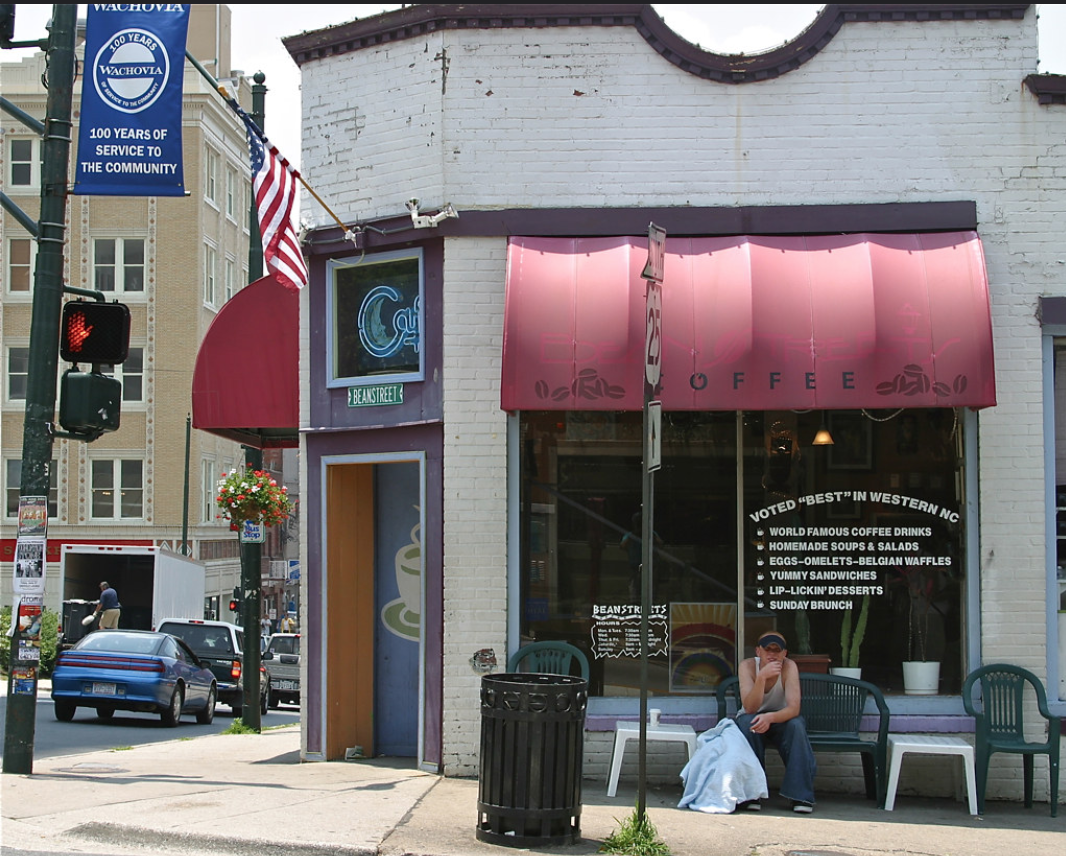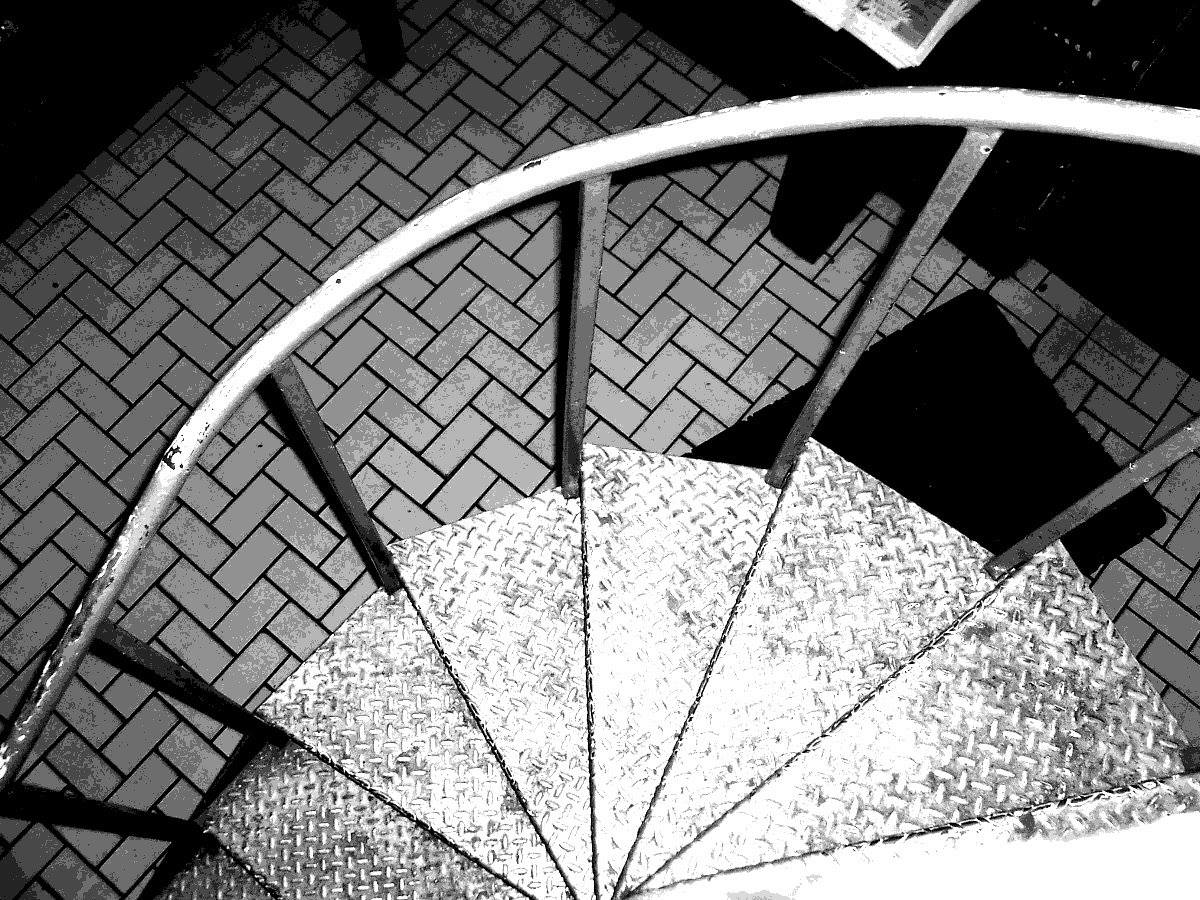It was the eve of Christmas Eve, so a kind of nothing day. Almost a holiday, but really an in-between day. A day for people who cared about Christmas and holidays to rush around buying last-minute gifts. Decorating, wrapping, baking. That’s what was going on at my house, and I was itching to get away from it.
So, when Sneaky Pete called to see if I wanted to get into something, I said yes. I abandoned the stack of presents my mother had assigned me to wrap, found my old L.L. Bean down vest, and slipped out the back door without telling anyone where I was going.
It was cold. A kind of dreary mid-day cold. The sky was heavy with clouds. But the downtown lamp posts were hung with decorations — silver bells and holly leaves. Even though most of the store fronts were empty, there was still a kind of cheer. The bookstore was open, and the bar across the street. The Greek lunch counter was serving, late into the afternoon, its windows steamy.
I walked through downtown, past Pritchard Park where Pete and I had hung out, back when we were cutting class. The air smelled of potential snow, a smell I loved. The anticipation of the first big snow was its own kind of holiday. I loved waking up to a world blanketed in white. Everything was muted and soft. Asheville usually got one or two big snows a year. The last had been in March — The Blizzard of ’93, people were calling it. I’d missed it, away at college.

Pete was waiting for me outside the new place, Beanstreets. He was leaning back, one foot kicked up against the wall, staring absently ahead while he smoked. Pete’s knit toboggan was rolled up, so his ears were exposed, the tips red with cold.
“Hey Sneak,” I called. He lifted his chin in greeting. “Hey Rat.”
No one remembered how Pete became Sneaky Pete. The nickname dated back to elementary school. Maybe earlier. Mine, Ratty Patty, was from 11th grade when I cut my hair short but kept one long lock in the back. My rattail. It was my signature.
Pete and I had been friends since preschool. Both of our mothers worked afternoons, so we went to day care together, and then an after-school program until we were old enough to look after ourselves. Our friendship felt like slipping into an old sweater. Kind of ugly and threadbare, but comfortable. Familiar.
“Let’s go inside,” I said, and Pete crushed his cigarette with his combat boot. We both ordered coffees and paid with a pile of change, like the good old days. Then we sat on one of the couches and jumped right into conversation as if we still saw each other every day and not every six months.
Really, Pete talked. About how the music scene was blowing up and how he was going to do this swing-blues-punk thing. “Real music,” he said. “I’ll make people listen. Not like all this pop bullshit.” Pete had stayed in Asheville, after high school, to work on his music. That mostly seemed to involve working for a landscaping crew in the warm months and living in the garage apartment behind his mother’s house, amassing a collection of rare ’78s.

I had gone off to college — done the expected thing. It was my second year studying journalism at UNC Chapel Hill, which I’d chosen mainly because my father taught there, so I got a tuition break. But it was a good school, and I liked the music scene of the Triangle area. I knew things were blowing up there, and it was exciting to be in the middle of it — even if I couldn’t go to as many shows as I wanted.
But Pete insisted it was Asheville that would the next Athens, Georgia. What was happening in Seattle was heading our way, he said. And he would be right here ready for it.
Pete and I shared a love of music. From my father, I learned about vintage rock and R&B. I also got most of my dad’s record collection when he moved out. I was in junior high, then. It was the worst time to endure a divorce, but music helped me get through.
Music also came to me through my granny, Catie-Mae. She was a ballad singer, born up in Madison County and barely ventured past the craggy homestead where she’d raised my mother. We went to visit Granny Catie on the holidays and sometimes on Sundays when she’d sing at her church. I was both in awe of her and terrified. Catie had looked old when I was a child and only grew more wizened and hunched, her hands knotted by arthritis and her hair snow white, fixed into a bun with a dozen bobby pins.
My mother had moved into Asheville as soon as she could, running from the holler where she was born. I wondered if I was doing the same thing — moving farther and farther from the soil my family called our homeland. Moving farther from the old mountain songs, drawn to the newness of indie-rock, grunge, and college radio.
Pete said he’d been working on something and did I want to hear it. I said yes, of course, even though he hadn’t asked me anything about Chapel Hill or college, or when I’d shaved my head. I was trying a new look, though I still had the rat tail. I wasn’t sure if I was ready to fully shed my old self.
The thing Pete was working on was a song, of course. He was always working on a song. When we were in junior high and high school he walked around with a smudgy salt-and-pepper notebook, jotting down ideas for song lyrics. Not only was Pete sure he had the making of an iconic song, he was also sure that someday his fans would care about his junior-high notebook. His story behind the story.

It turned out Pete had been taking guitar lessons from an old bluesman who was renting a room at the Gray Rock Inn. We walked down there, through the cold. I was glad for my battered old down vest, its holes and snags repaired with silver duct tape. I was less glad for my choice of canvas Converse high tops, which did little to keep my toes warm.
At the Gray Rock Inn we knocked on a third-floor room and were let in by a man with the face of a winter apple. “Midnight Stilton,” he introduced himself. He was perched on a single bed, dressed in a suit and hat, holding a resonator guitar.
“I’m Patricia,” I said, holding out my hand to shake his.
Pete scoffed at my full name. “That’s ole Ratty Patty,” he said. He plopped down in the only chair in the narrow room. There was no place for me to sit, so I learned against the doorway trying to look casual. I wanted to tell Midnight Stilton that I was going by my full name, but I wasn’t sure he’d heard me the first time. What did he care about my identity?
“You play?” he asked me, his voice sandpaper-rough.
“Not really.”
Pete helped himself to another of Midnight’s guitars — there were three leaning against the wall — and began to pick out a tune. It was something between blues and grunge. Off-kilter, kind of seasick. Midnight listened with interest and added a lick, here and there, from his resonator guitar.
Late afternoon melted into evening. Pete and Midnight traded tunes and passed a small bottle of liquor back and forth. I felt like a fly on the wall — not really a part of the scene, but still there, recording it for posterity. It made sense, because I wanted to be a journalist, which I knew would mean many fly-on-the-wall scenarios. But I also felt like I was losing my grip on who I’d been — Ratty Patty, Sneaky Pete’s best friend — in order to become whomever I was becoming.

“We should head,” Pete finally announced, standing up. “There’s a show at Vincent’s Ear.” It was another new place: A coffee shop by day and music venue by night. More evidence, Pete insisted, that Asheville was about to be on the map. The new bands played there. Metal and punk and a kind of dirtied-up country that could only come from a collision of Asheville past and present.
Midnight stood up, too, and said he’d walk with us a bit. He packed his guitar into its case and shouldered it, adding a wool overcoat and thick fur cap to his ensemble. The three of us walked back up Biltmore Avenue, which had grown crowded. It was the night of the Warren Haynes Christmas Jam, the fifth anniversary of the holiday concert. It wasn’t holiday music per se, but sets of jam and rock by Warren, who had grown up in Asheville, and found his way to musical fame in the Allman Brothers’ band.
But Pete wasn’t interested in stopping outside of Be Here Now where the Christmas Jam fans were lined up. “That’s sound is done,” he said, moving faster up the street. I wasn’t sure if he was trying to get out of the cold or get to whatever it was he considered new and next and cool. I slowed my pace to match Midnight, because it seemed rude to leave an old man behind. And maybe Midnight was thinking the same about me — that it would be rude ditch me when Pete obviously had.
Together, Midnight and I turned into the courtyard access to Vincent’s Ear. When I’d been there in the summer, the courtyard had been full of high school and college-age kids smoking and talking. That night, the eve of Christmas Eve, the courtyard was nearly empty. But a loud rumble from the bar poured out into the night each time someone opened the door. The band onstage was clearly testing the limits of the sound system. “Maybe we should sit here for a minute,” I said.
Midnight sat in a café chair and took out his guitar. The resonator sounded different outside — storied and rounded and filled with memory. I sat back, looking for stars in the night sky. There was too much light from downtown, but still, I knew the stars were there, glittering above us. And something came over me. As Midnight played a mournful and blues-soaked melody, the words welled up in me:
Oh, listen to my story, I’ll tell you no lies,
How John Lewis did murder poor little Omie Wise.
He told her to meet him at Adams’s Springs.
He promised her money and other fine things.
It was a ballad I’d heard Catie-Mae sing a hundred times and there it was, pouring out of my own mouth. But in that moment, it wasn’t a mountain ballad anymore. Something old, something new, something borrowed, something blue. I’d married an Appalachian song to a blues tune and damn if it didn’t work.
When I finished, Midnight faded out his chord progression and let out a low whistle. “That was fine, Patricia,” he said. “Real fine.”
I blushed in the darkness. “You, too. Your playing, I mean. It’s wonderful.”
Midnight returned his guitar to its case and stood. He gave a little bow. “I’ll be off now. You have a merry Christmas.”
“Merry Christmas,” I said. But I didn’t get up — not to leave the courtyard or to go into Vincent’s Ear. I kept sitting there in the dark, feeling the cold on my face and through my dumb sneakers. Still feeling the cold, but also feeling warm inside, like you’re supposed to feel on Christmas Eve. Maybe even on the eve of Christmas Eve. Like something big is about to happen, and you’re right there ready for it.
